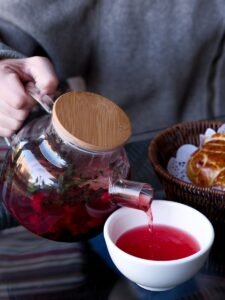Hibiscus Tea: All You Need To Know

All You Need to Know About Hibiscus Tea
Hibiscus tea, a vibrant ruby-red herbal drink, has been cherished for centuries for its tangy flavor and health benefits. Whether you’re a tea enthusiast or exploring natural ways to boost your health, hibiscus tea is worth adding to your collection. Here’s everything you need to know about this delightful beverage.
What is Hibiscus Tea?
Hibiscus tea is made from the dried calyces (the sepals of the flower) of the Hibiscus sabdariffa plant. Known for its tart and slightly cranberry-like flavor, this caffeine-free infusion can be enjoyed hot or iced. It’s a staple in many cultures, going by names such as karkade in the Middle East and sorrel in the Caribbean.
Nutritional Value
Hibiscus tea is low in calories but packed with vitamins and minerals, including:
- Vitamin C: Boosts the immune system.
- Iron: Supports red blood cell production.
- Antioxidants: Helps fight free radicals, reducing oxidative stress.
Health Benefits of Hibiscus Tea
Hibiscus tea is more than a tasty drink—it offers several potential health benefits:
- Lowers Blood Pressure
Studies suggest that hibiscus tea can help lower systolic and diastolic blood pressure, making it a natural remedy for hypertension. - Promotes Heart Health
By reducing cholesterol and triglycerides, hibiscus tea may contribute to better heart health. - Rich in Antioxidants
The antioxidants in hibiscus tea help combat inflammation and support overall health. - Aids Weight Management
Hibiscus tea has been linked to improved metabolism and reduced fat accumulation. - Supports Liver Function
Research shows that hibiscus tea can improve liver health by increasing detoxification enzymes. - Fights Infections
Its high vitamin C content and antimicrobial properties can help combat colds and infections.
How to Prepare Hibiscus Tea
Making hibiscus tea is simple:
- Boil water.
- Add 1-2 teaspoons of dried hibiscus flowers per cup of water.
- Steep for 5-10 minutes.
- Strain and enjoy! You can sweeten it with honey, add lime for extra tang, or mix with other herbs like ginger or mint for a unique twist.
For iced hibiscus tea, brew a stronger concentrate, let it cool, and serve over ice.
Precautions and Side Effects
While hibiscus tea is generally safe, there are a few things to keep in mind:
- Pregnancy and Breastfeeding: Consult a healthcare provider before drinking hibiscus tea, as it may induce uterine contractions.
- Blood Pressure: If you have low blood pressure or take medication for hypertension, monitor your intake to avoid excessive drops in blood pressure.
- Medication Interactions: Hibiscus tea may interact with certain medications, such as diuretics and anti-inflammatory drugs.
Where to Buy Hibiscus Tea
You can find hibiscus tea in health food stores, online retailers, and even local markets. Look for organic, non-GMO products for the best quality.
Final Thoughts
Hibiscus tea is a delicious, health-boosting beverage with a rich cultural history. Whether you’re sipping it for its tart flavor or its potential health benefits, it’s a fantastic addition to any tea lover’s pantry. So brew yourself a cup and enjoy a moment of wellness with this ruby-red elixir!
Have you tried hibiscus tea? Share your favorite recipes or experiences in the comments below!

Comments